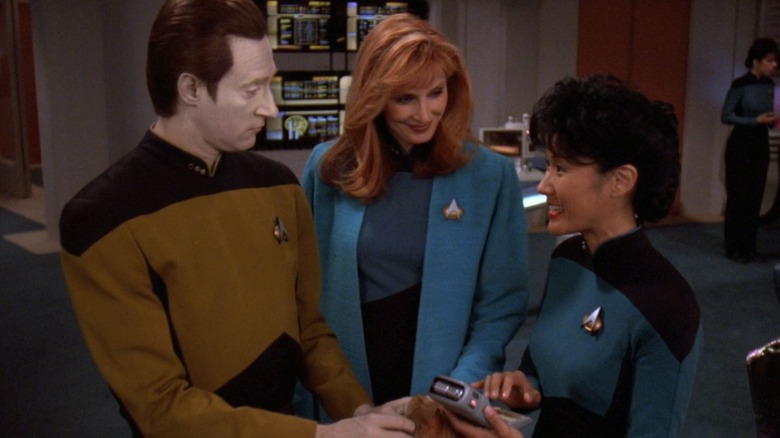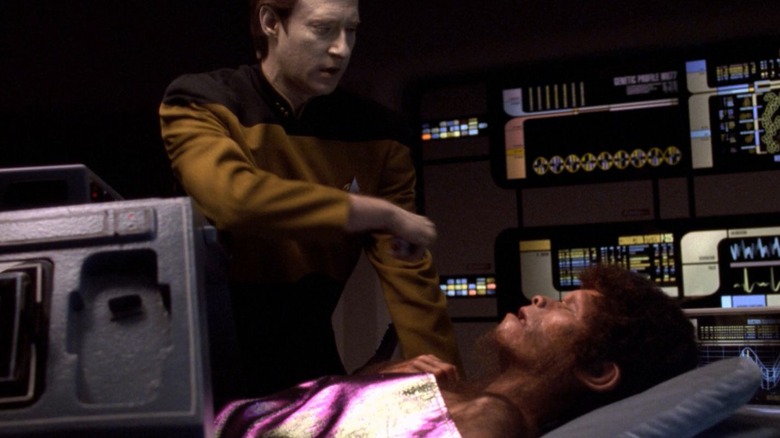Star Trek's Genesis Episode Allowed Gates McFadden To Settle A Sickbay Frustration
On the "Star Trek: The Next Generation" episode "Genesis" (March 19, 1994), the eternally nervous Lieutenant Reginald Barclay (Dwight Schultz) goes to sickbay insisting he has Terellian Death Syndrome. Dr. Crusher (Gates McFadden), finding it's a mild flu, injects him with a synthetic T-cell, activating a gene that would provide him with immunities. Unwittingly, Dr. Crusher also activates every dormant gene in Barclay's body, causing ancient, pre-evolutionary "memory" genes to activate and forcing Barclay to change species. Barclay suddenly evolves into a spider. It spreads, naturally. Nurse Ogawa (Patti Yasutake) evolves into an ape. Commander Riker (Jonathan Frakes) evolves into a protohuman. Data (Brent Spiner) evolves into a 1980 Commodore VIC-20.
That last one was a little joke. Data is fine.
"Genesis" has a lot of great makeup effects (by the show's hardworking makeup technician Michael Westmore), but the premise is a little silly, even for "Star Trek." Then again, the science in "Genesis" is just as medically sound as "The Island of Lost Souls," so perhaps your average sci-fi fan is willing to be a little forgiving. "Genesis" also marks the only time McFadden directed an episode of "Next Generation." She joined fellow castmates Frakes (who directed eight episodes), Patrick Stewart (who directed five), and LeVar Burton (three) in the club. It's also the only time McFadden has been credited as director on any film or TV series.
McFadden recently spoke on the Star Trek Cruise VII (recorded by StarTrek.com) about directing "Genesis," revealing she was finally able to address a problem with sickbay on the U.S.S. Enterprise-D. Throughout "Next Generation," sickbay was largely empty, maybe only treating one patient at a time. McFadden, as director, finally got to fill it with patients, nursing staff, and even a pregnant cat. At long last, sickbay could be bustling with activity.
That opening scene
Since McFadden played the chief medical officer on the Enterprise, she was on the sickbay set a lot, and likely had time to think about her character's office, her day-to-day medical responsibilities, and the fact that Dr. Crusher had to oversee the physical wellbeing of over 1,000 people living on the Enterprise. It irked her that when characters visited sickbay, Dr. Crusher was typically there by herself. Occasionally, a character required serious medical attention, but then sickbay would become a space devoted to only one patient. Very occasionally, one might see someone being treated in a background shot, but there was frustratingly little activity otherwise.
The opening sequence of "Genesis" corrected all that. McFadden employed fluid camera movements, shooting, in one take, Commander Riker having cactus needles pulled from his back, Barclay complaining of imagined illnesses, and Data bringing in his cat, Spot, for a pregnancy checkup. In the background, other extras and medical professionals walk around checking on experiments and treating patients. It's the first time sickbay had had that much activity. McFadden said that too many sickbay scenes throughout "Next Generation" were "static."
Of course, that opening take provided an interesting challenge, as McFadden had to work with a cat. Not only did McFadden have to choreograph multiple actors to "dance" around her camera, but her shot had to settle on a cat ... and the cat wasn't happy. She recalled:
"Anything you do with cats can be very difficult. [...] What was hilarious to me is because I love cats, and I've had cats all my life. You get them purring and it's easy. But Spot was not happy that day. You can see by the face, which was like, 'My agent does not want me to do this.'"
Stepping away from the action
One might note that, during "Genesis," Dr. Criusher is largely removed from the action early on. Worf (Michael Dorn) evolves into a strange, monstrous, pre-Klingon creature with poison sacs in his mouth. He sprays Dr. Crusher in the face with poison and she topples backward, clutching herself. Dr. Crusher only returns for the final scene of the episode. Her absence allows the virus to spread throughout the ship. This likely also allowed McFadden to focus more on directing and less on acting.
McFadden noted that her favorite shot in "Genesis" was when Picard and Data (who were off the Enterprise when the disease struck) discovered the australopithecine Riker in Picard's ready room. They call his name and Riker turns around, with McFadden putting the camera right up close to his face to reveal a low brow and a lot of new facial hair. McFadden said she liked the intensity in Frakes' eyes.
McFadden also said she liked the visual variety of the episode. There had been several "virus" episodes of "Star Trek" in the past, but this was the first time the virus affected each character differently. On that topic, McFadden said:
"One of the most interesting things in this episode is that, a lot of times, when there's a virus like the one in 'The Naked Now,' it affects all of the crew in the same way. [In 'Genesis,'] everyone was supposed to be feeling it in their own way because everyone evolves to be a different species or animal."
One might wonder why McFadden hasn't directed since. Perhaps she merely felt no urge to, proud of what she already accomplished.


